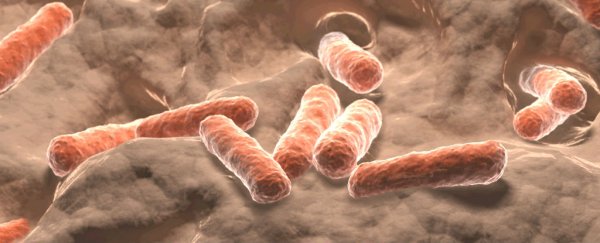Our digestive system is home to a weird and wonderful collection of bacteria, and we're only just beginning to understand how these unique populations are not just having an effect how we digest our food, but potentially even how we think and behave.
And now new research has found that the situation in our guts is even stranger than we thought, with biologists suggesting that we may need to define a whole new type of life form to describe these tiny residents.
A team from the Pierre and Marie Curie University in Paris, France has been attempting to redefine the way we classify the organisms living inside our colons. By studying 86 different gene families, they've discovered DNA sequences that are different enough to suggest they're beyond the three forms of life that we currently recognise.
Those forms are classified as bacteria, archaea, and eukaryotes. Archaea were once bundled with bacteria, but have a different biochemical make-up and can survive in more extreme conditions, whereas eukaryotes refers to fungi, plants, and animals.
What the Paris team, led by Philippe Lopez and Eric Bapteste, found makes the case for a fourth type being added to that list, but it's important not to get ahead of ourselves - it might also mean that the existing types are more genetically diverse than we thought.
New Scientist explains the findings, published in the journal Biology Direct.
"They analysed microbiome samples, recovering about 230,000 DNA sequences that are related to known sequences in those 86 gene families. They then used these sequences as the starting point for a second analysis - a little like digging deeper into your ancestry by using your parents' DNA rather than your own to guide the search. This revealed an additional 80,000 stretches of microbial DNA that belonged in the 86 gene families.
But the sequence of bases was highly unusual in about one-third of the DNA - it shared just 60 percent or less of its identity with any known gene sequences. That degree of difference is what you might expect to separate different domains of life, such as bacteria and archaea."
But before a fourth domain can be added, scientists will need to isolate and study these organisms in a lab environment, and that's no easy task. Right now, around 99 percent of microbes can't be grown in the lab, which is why there's still so much we don't know about these basic forms of life. Plus many genes are swapped around between microbes, further adding to the confusion, which is one of the reasons why this research focuses on gene families that don't often cross over.
"These results underline how limited our understanding of the most diverse elements of the microbial world remains, and encourage a deeper exploration of natural communities and their genetic resources, hinting at the possibility that still unknown yet major divisions of life have yet to be discovered," concludes the report.
There's still a lot of work to do, but these findings are definitely cause for excitement if you're a keen biologist. "Let's wait to see how unusual the organisms are," Bapteste told New Scientist. "Scientists have found a huge diversity of microbes in the human gut, so I would not expect it to be necessarily hostile to different life forms."
